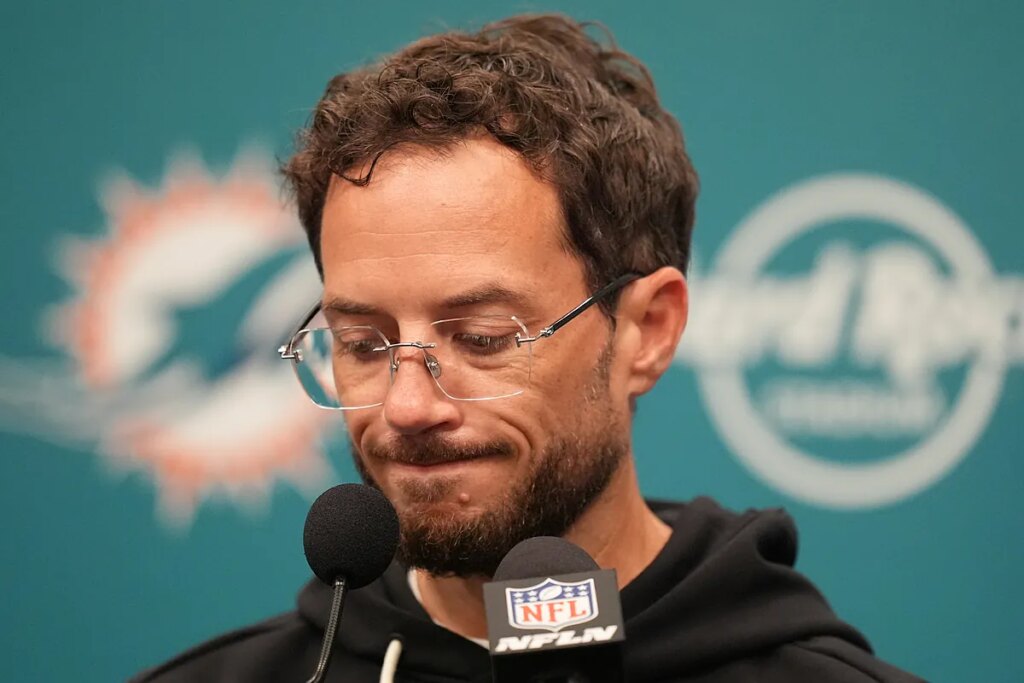The Miami Dolphins‘ season has hit rock bottom and it’s not just their record that’s causing concern.
After Sunday’s 29-27 loss to the Los Angeles Chargers dropped the team to 1-5, quarterback Tua Tagovailoa and head coach Mike McDaniel appear to be at odds over how to fix the NFL team’s growing issues behind closed doors.
For the first time in his career, Tagovailoa openly questioned his teammates’ professionalism and accountability, claiming that the Dolphins‘ problems go far beyond missed tackles or dropped passes.
“We have guys showing up to player-only meetings late, guys not showing up to player-only meetings,” Tagovailoa said postgame. “There’s a lot that goes into that. It’s a lot of things of that nature that we’ve got to get cleaned up.”
It was a striking admission from a quarterback known for his composure and diplomacy – one that painted a picture of a locker room losing its grip. The Dolphins have now lost four straight games by one score or less, blowing late leads and looking increasingly disorganized in crucial moments.
But what could have been interpreted as a rallying cry from the team’s leader quickly turned into a point of friction. McDaniel publicly downplayed Tagovailoa’s comments a day later, contradicting the notion that attendance issues were a reflection of deeper problems.
“Clearly he’s sending a message,” McDaniel said. “But from my standpoint, everything I’ve asked of guys, they’ve delivered on. I’m sure whoever he’s talking to, they’ll deliver.”
The coach’s words, calm but unmistakably dismissive, made it clear that he didn’t share his quarterback’s frustration, at least not publicly. While Tagovailoa was urging accountability, McDaniel emphasized patience, arguing that the extra player-led meetings were voluntary and that his players had otherwise met expectations.
That split in tone reflects a bigger problem in Miami: a franchise that seems increasingly out of sync, both on the field and off it.
The Dolphins’ losses have followed a familiar pattern, early promise, costly mistakes, and a fourth-quarter collapse. Against the Chargers, Miami led 27-26 in the final minute before surrendering a 40-yard kickoff return and a 42-yard pass from Justin Herbert to Ladd McConkey, setting up the game-winning field goal.
“There’s zero victory that would be considered moral,” McDaniel said after the game. “Our job is not to take a bunch of L’s. We need to go back to work, be tough-minded, and figure out how we’re going to attack the next opponent.”
Tagovailoa, meanwhile, sounded far less measured. “Shocked, I guess you could say,” he admitted. “This is something that we’ve talked about collectively as a team, being able to finish in games like this where we have the opportunity to win. And it’s not just one side of the ball. It’s every phase.”
?Frustration in the locker room
That frustration was echoed across the locker room. Defensive end Jaelan Phillips described the mood as “disappointing,” while other players refused to speak at all. Fans voiced their anger, too, booing the team off the field as a plane flew overhead calling for the firings of McDaniel and general manager Chris Grier.
The fallout has extended beyond the stadium. Dolphins legend Larry Csonka posted on social media that the team “has talent and moments of good execution” but remains “inconsistent, which boils down to rehearsal.”
For longtime fans, the sentiment is all too familiar. Miami hasn’t won a playoff game in 25 years, the longest active drought in the NFL.
McDaniel‘s overall record now stands at 29-30 after a 9-17 run since the midpoint of last season. The same offensive brilliance that once made the Dolphins one of the league’s most feared teams now looks stagnant, and the optimism that surrounded McDaniel’s arrival has given way to questions about his leadership.
“Football games and life don’t just happen to you,” McDaniel said in defense of his approach. “Losing’s hard and it feels like trash. But regardless if they’re high-fiving you or booing you, you have control over the next result and that’s it.”
That sentiment may be true, but for the first time, it seems his quarterback isn’t entirely on board. Tagovailoa’s public comments suggest a player tired of repeating the same mistakes, and perhaps one losing faith in the locker room’s ability to self-correct.
As the Dolphins prepare for another must-win week, the tension between coach and quarterback looms larger than any opponent. If Miami can’t fix its culture soon, this season’s collapse could become more than just another lost year, it could mark the breaking point for one of the NFL’s most volatile partnerships.
Read the full article here

